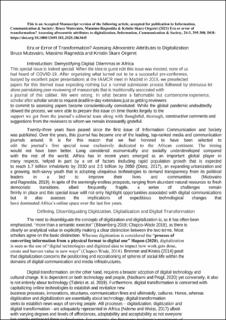| dc.description.abstract | This special issue is indeed special. When the idea to guest edit this issue was mooted, none of us had heard of COVID-19. After organizing what turned out to be a successful pre-conference, buoyed by excellent paper presentations at the IAMCR meet in Madrid in 2019, we preselected papers for this themed issue expecting nothing but a normal submission process followed by strenuous let alone painstaking peer-reviewing of manuscripts as traditionally expected from a journal of this caliber. We were wrong. In what became a fathomable but cumbersome experience, scholar after scholar wrote to request deadline-day extensions just as getting reviewers to commit to assessing papers became conscientiously convoluted. While the global pandemic undoubtedly slowed the process, we were able to prepare this issue on time thanks largely to the support we got from the journal’s editorial team along with thoughtful, thorough, constructive comments and suggestions from the reviewers to whom we remain incessantly grateful.
Twenty-three years have passed since the first issue of Information Communication and Society was published. Over the years, this journal has become one of the leading, top-ranked media and communication journals around. It is for this reason that we feel honored to have been selected to edit the journal’s first special issue exclusively dedicated to the African continent. The timing would not have been better. Long considered economically and socially underdeveloped compared with the rest of the world, Africa has in recent years emerged as an important global player in many respects, helped in part by a set of factors including rapid population growth that is expected to reach 1.7 billion inhabitants by 2030 and 2.5 billion by 2050 (Dietz, 2017), an expanding urbanization and a growing, tech-savvy youth that is adopting ubiquitous technologies to demand transparency from its political leaders in a bid to improve their lives and communities (Mutsvairo & Ragnedda, 2019a). In spite of the seemingly endless prospects, ranging from abundant natural resources to fresh democratic transitions, albeit frequently fragile, a series of challenges remain firmly in place and this special issue not only highlights so-called opportunities associated with digital communications but also assesses the implications of expeditious technological changes that have dominated Africa’s online space over the last few years. | en_US |

